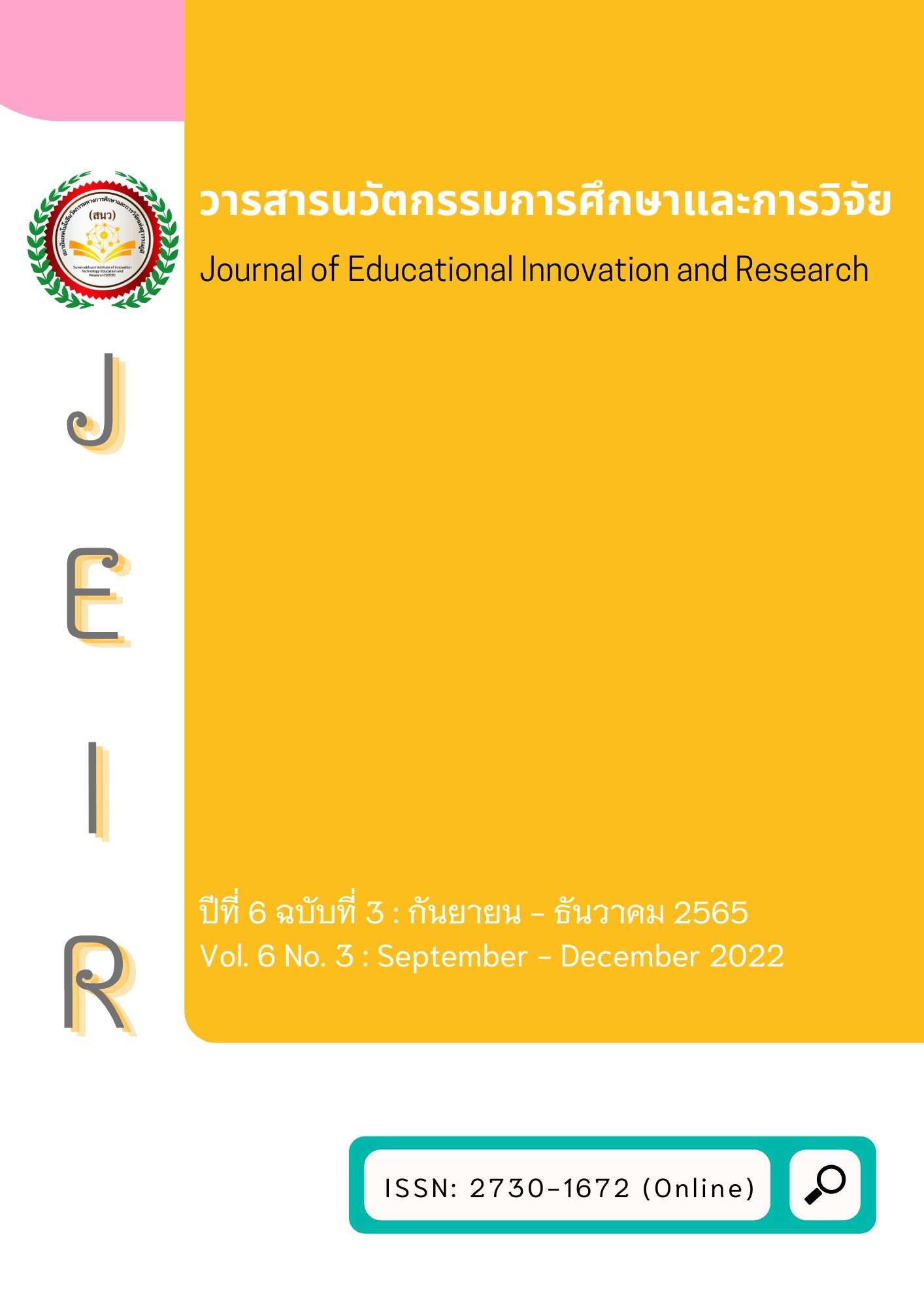อิทธิพลทางสังคมที่มีผลต่อความตั้งใจซื้อโปรแกรมการใช้งาน ของผู้ประกอบธุรกิจ ผ่านสมาร์ตโฟน ในเขตกรุงเทพและปริมณฑล
Main Article Content
บทคัดย่อ
การวิจัยครั้งนี้ มีวัตถุประสงค์เพื่อศึกษาผลกระทบของอิทธิพลทางสังคม ต่อความคาดหวังต่อประสิทธิภาพ ต่อความไว้วางใจ ต่อความตั้งใจซื้อโปรแกรมการใช้งานของผู้ประกอบธุรกิจที่ใช้ผ่านสมาร์ตโฟน ระเบียบวิธีวิจัย ข้อมูลเชิงคุณภาพใช้การสัมภาษณ์เชิงลึก ผู้ให้ข้อมูลหลัก จำนวน 6 ราย ข้อมูลเชิงปริมาณ เก็บรวบรวมข้อมูลจากแบบสอบถามจากผู้ประกอบธุรกิจ ที่ใช้โปรแกรมการใช้งานผ่านสมาร์ตโฟน จำนวน 400 ราย โดยใช้การสุ่มตัวอย่างเป็นการสุ่มแบบไม่อาศัยความน่าจะเป็น (nonprobability sampling) วิธีการเลือกตัวอย่างแบบเจาะจง (judgmental sampling) เทคนิคการวิเคราะห์ข้อมูล วิเคราะห์ตัวแบบจำลองสมการโครงสร้างด้วยโปรแกรมสำเร็จรูปทางคอมพิวเตอร์ (SEM)
ผลการวิจัยพบว่า อิทธิพลทางสังคมส่งผลกระทบทางบวกต่อความคาดหวัง ต่อประสิทธิภาพและมีผลกระทบทางตรงต่อความไว้วางใจ แต่มีผลกระทบทางตรง ต่อความตั้งใจซื้อในระดับต่ำอย่างไม่มีนัยสำคัญทางสถิติ ส่วนความคาดหวังต่อประสิทธิภาพ มีผลกระทบทางบวกกับความไว้วางใจและความตั้งใจซื้อ และความไว้วางใจมีผลกระทบทางบวกต่อความตั้งใจซื้อในระดับต่ำอย่างไม่มีนัยสำคัญทางสถิติ
เนื่องจากว่าในสถานการณ์โรคระบาดที่อยู่ในเวลาที่ผู้วิจัยดำเนินการวิจัย การติดต่อกับผู้ประกอบการเป็นไปได้ยากและมีอุปสรรคมาก จึงเป็นเงื่อนไขของการเก็บข้อมูล
ข้อเสนอแนะทางวิชาการ การวิจัยครั้งนี้ได้นำเอาตัวแปรสำหรับการวิจัยทางด้านธุรกิจและเทคโนโลยีมา 3 ตัวแปรหลัก ตัวแปรที่หนึ่ง คือ อิทธิพลทางสังคม (Social Influence) ตัวแปรที่สอง คือ ความคาดหวังต่อประสิทธิภาพ (Performance Expectancy) และ ตัวแปรที่สาม คือ ความไว้วางใจ (trust) ตัวแปรทั้งสามมาจากการทบทวนวรรณกรรมและวารสารวิชาการที่เกี่ยวข้องเพื่อให้ผู้สนใจได้นำไปศึกษาเพื่อเพิ่มประสิทธิภาพ ในการทำงานและพัฒนาธุรกิจต่อไป
Article Details

อนุญาตภายใต้เงื่อนไข Creative Commons Attribution-NonCommercial-NoDerivatives 4.0 International License.
เอกสารอ้างอิง
ธีรวุฒิ เอกะกุล. (2543). ระเบียบวิธีวิจัยทางพฤติกรรมศาสตร์ และสังคมศาสตร์ .อุบลราชธานี: สถาบันราชภัฎอุบลราชธานี.
Aristio, A.P., Supardi, S., Hendrawan, R.A. and Hidayat, A.A. (2019). Analysis on Purchase Intention of Indonesian Backpacker in Accommodation Booking through Online Travel Agent. Procedia Computer Science,161, 885-893.
Cochran, W.G. (1977). Sampling Techniques. 3rd Edition. New York: John Wiley & Sons.
Creswell, J. W. (2003). Research design: Qualitative, quantitative, and mixed methods approaches. (2nd ed.). Thousand Oaks, CA: Sage.
Danisa, T. C. E., et al. (2017). The Effect of Electronic Word of Mouth, Trust, Perceived Risk, and Site Quality on Transactions using E-Commerce. International Conference “Sustainable Development Goals 2030 Challenges and Its Solutions, 1, 191–208.
Fatmawati, I. & Fauzan, N. (2021). Building Customer Trust through Corporate Social Responsibility: The Effects of Corporate Reputation and Word of Mouth. Journal of Asian Finance Economics and Business, 8(3),0793-0805.
Gu, J.C., Lee, S.C., & Suh, Y.H. (2009) Determinants of behavioral intention to mobile banking . Expert Systems with Applications,36(9),11605–11616.
Holden, J.M. & Overmier, J.B. (2015). Choice behavior under differential outcomes: Sample stimulus control versus expectancy control. Learning and Motivation, 51, 50-61.
Kim, M.J., Chung, N. & Lee, C. (2011). The effect of perceived trust on electronic commerce: Shopping online for tourism products and services in South Korea. Tourism Management, 32, 256-265.
Lu, J. (2014). Are personal innovativeness and social influence critical to continue with mobile commerce?. Internet Research, 24(2), 134-159.
Lukmanjaya, A. (2013). Explanatory Study: The Impact of Trust In Kaskus on Kaskusers Purchase Intention. jouurnal Ilmiah Mahasiswa Universitas Surabaya,2(2), 6-7.
Pachler, N., Seipold, J. and Bachmair, B. (2014). Mobile learning: strategies for planning and implementing learning with mobile devices in secondary school contexts. Marilyn Leask: Norbert Pachler.
Pãvãloaia, V.D. (2013). Methodology approaches regarding classic versus mobile enterprise application development. Informatica Economical,17(2), 59.
Singer, G., & Zalmanson, L. (2013). Content or Community? A Digital Business Strategy for Content Providers in the Social Age. MIS Quarterly, 37(2), 591-616.
Suh, B. & Han, I. (2003). The Impact of Customer Trust and Perception of Security Control on the Acceptance of Electronic Commerce. International Journal of Electronic Commerce, 7, 135-161.
Sukrat, S., Papasratorn, B. & Chongsuphajaisiddhi, V. (2015). Impact of Customer Trust on Purchase Intention in Organic Rice through Facebook: A Pilot Study. The 10th International Conference on e-Business (iNCEB2015), 1-11.
Turban, et al. (2008). Electronic Commerce: A Managerial Perspective. New York: John Wiley & Sons.
Venkatesh, et al. ( 2012). Consumer Acceptance and Use of Information Technology: Extending the Unified Theory of Acceptance and Use of Technology. MIS Quarterly, 36(1), 157-178.
Venkatesh, et al. (2003). User Acceptance of Information Technology: Toward a Unified View. MIS Quarterly, 27(3), 425–478.
Yong Liu, et al. (2019). How Social Support Motivates Trust and Purchase Intentions in Mobile Social Commerce. Review of Business Management, 21(4), 839–860.
Yoon, S. J. (2002). The Antecedents and Consequences of Trust in Online-Purchase Decisions. Journal of Interactive Marketing, 16(2), 47–63.
Zainudin, et al. (2020). The Influence of Trust on The Intention to Perform electronic Word-of-Mouth (eWOM) and Purchase Intention Among S-Commerce Users. International Journal of Academic Research in Business and Social Sciences, 10(10), 1114–1130.


